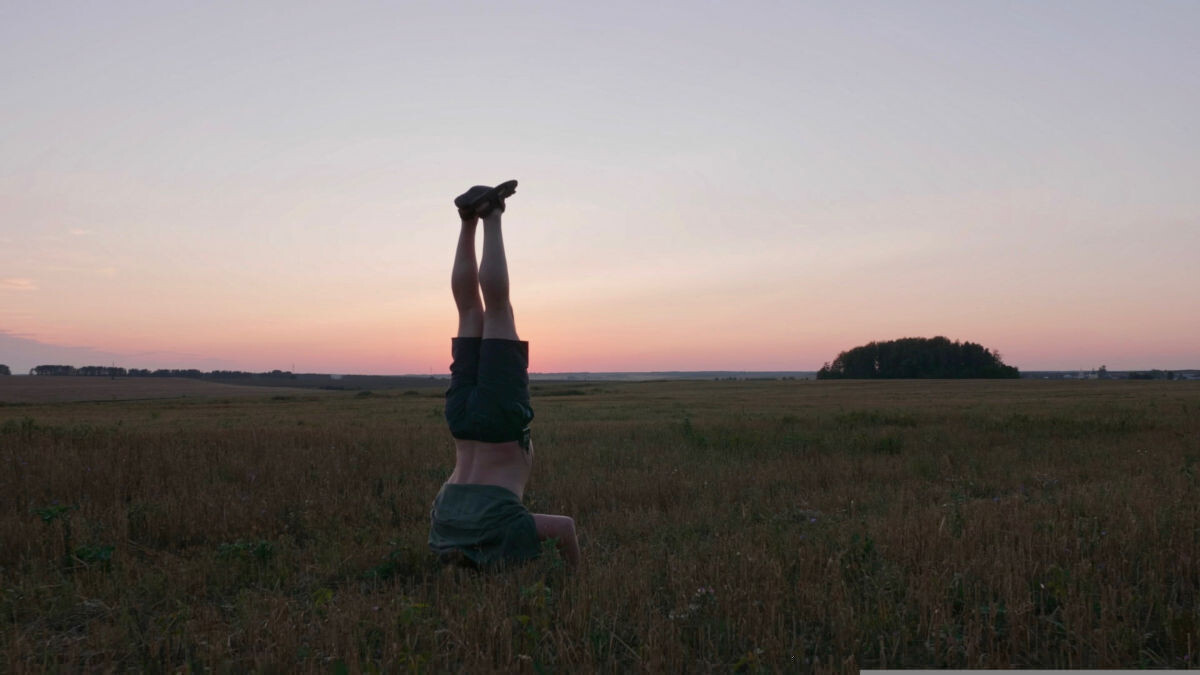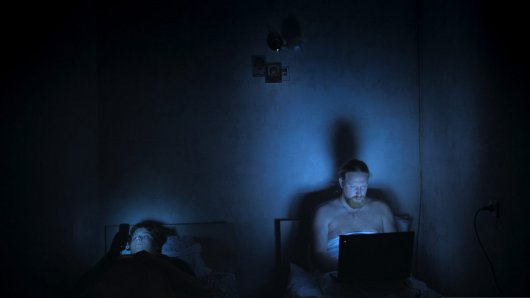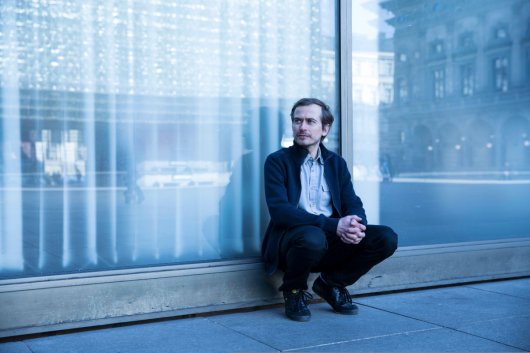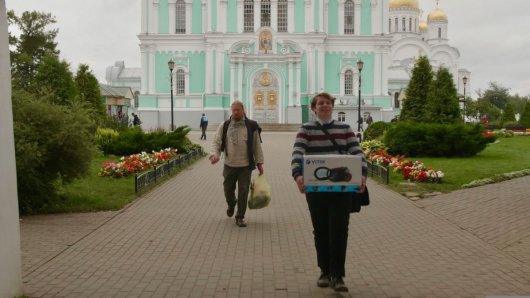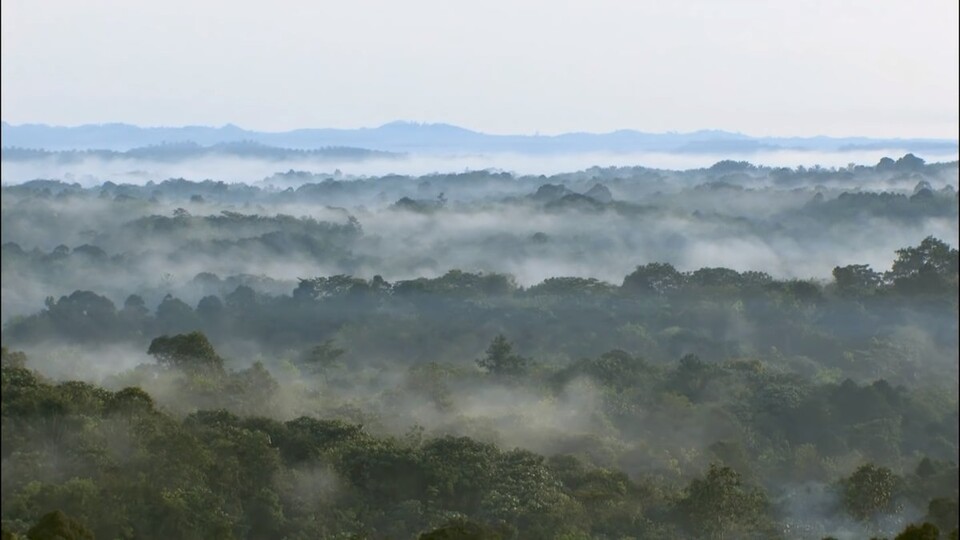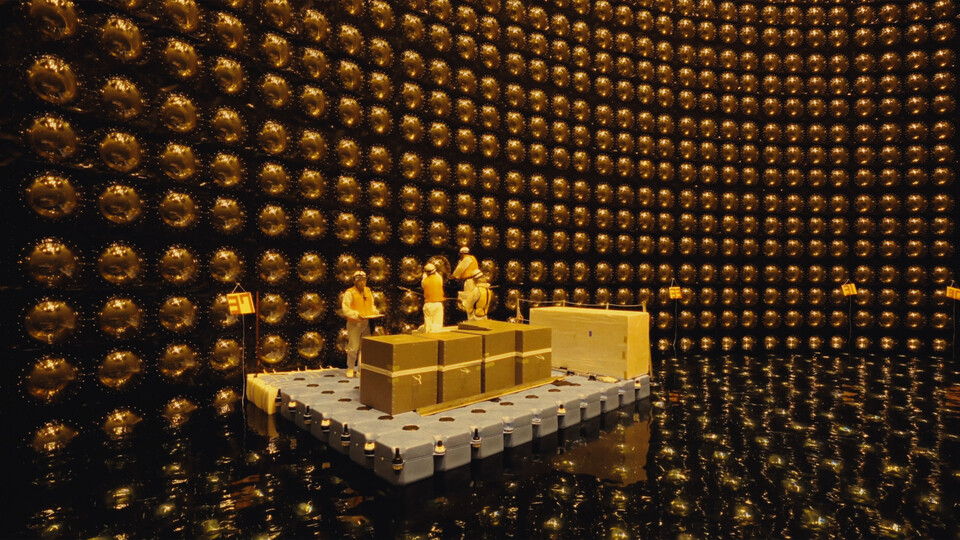To Surprise Myself
Could you tell us more about the origins the film Over the Hills? How did you get to know your main protagonist, Vít Kalvoda?
About five years ago, I worked on one story related to financial consultancy and at the time, Vít Kalvoda served as an ombudsman helping people who had been damaged by financial predators – although he himself used to be a financial advisor. We arranged a consultancy session and during our very first meeting in a pub, I asked what made him start working as a financial advisor. As a response, he provided a very colourful and intimate account of his life – he used to be a hippie practicing Zen Buddhism who founded a family at a very young age, and the story continued. I was mesmerised by his Odyssey and all of his adventures that sounded like a combination of development and picaresque novel. At that time when I arrived home, I immediately sent him an email suggesting to somehow record his story. We exchanged messages and this exchange gradually evolved into a sort of an “analysis in letters” – he answered my questions, adding chapters to the chronicle of his life that I subsequently edited. We ended up with three hundred pages of text, with references and comments, which I called a docunovel. I asked several people to read excerpts of that novel and they all agreed that it was a story to be filmed as a fiction film, or even a TV series. The portrayal of the times as a journey full of stumbles. Like Barry Lyndon by Stanley Kubrick, a great adaptation of a novel by W. M. Thackeray, in which the protagonist assumes various identities, or Paul Thomas Anderson’s Boogie Nights. But I didn’t have enough courage to shoot a similar three-hour-long tapestry or TV series so I tried to cut the story down. I asked scriptwriter Tomáš Bojar and then Marek Šindelka for help and we spent one year of intensive editing and produced several storyline versions. But we were not really happy with any of them. As we edited the story and tried to make it more dramatic, it became less fascinating, colourful and also less credible. At one point I stopped and went back to the start. I decided to make it completely minimalist and so we set out on a journey with the real characters of Vít Kalvoda and his son Gríša.
How did the original testimony about a hero of our time transform into such an intimate portrait, with the social aspect completely sidelined?
What is intimate is universal! I wanted to make a focused film. The descent into the very core of family relations was the most important thing that happened during the shooting. Everything else is contained in crucial social details, bubbling under the surface and determining the main flow. I hope that all of our preparations came to fruition. I believe that Over the Hills tells a story about a hero of our time – or someone who still has a chance to become one – to mature. But what exactly is this “social aspect”? For instance, half of Czech marriages get divorced. Over the Hills provides a testimony about a divided family and the desire to form some sort of a family again, at least for a while. It does not matter if the journey may be five metres or five thousand kilometres long, what is important is the determination to take it.
Your previous films emphasised the social dimension of reality and were often labelled as engaged documentaries. Have you abandoned the label of an activist filmmaker in your latest film?
It’s the others who put labels on our work for their own purposes so I myself had no label to abandon. I enjoy switching between instruments and films are a sort of a quest and recreation to avoid stagnation or fading. Over the Hills was perhaps a challenge to dive into different, more mysterious waters. And to surprise myself.
The social aspect of the film can be the portrayal of contemporary Russia free of preconceptions. In the context of today’s turbulent relations with Russia, this documentary opens up a landscape characterised by spirituality rather than poverty. How do you perceive this?
The image of Russia presented in our country is certainly a bit distorted. What gets across is mainly the autocracy of one ruler, wild dissidents and countryside “babushkas”. And yet the emotional and intimate aspect of Orthodoxy is so important. In Czechia, we don’t see much of Berdyaev’s Russia with its spiritual complexity. What I find crucial in the film is the visit to the Kapustin family where Vít and Gríša drop by to say hello. In a huge and unfriendly Russian block of flats lost somewhere at the outskirts of Moscow, there is someone you would also want to have for our neighbours.
From the film Over the Hills
How did you feel about filming in Russia? Did you need any permission?
We got an invitation letter from the Czech Center in Moscow written in Russian and explaining the purpose and destination of our trip. That was actually what got us through the Russian border. We didn’t apply for any other permissions though. The crew, the equipment and the whole process of shooting was intentionally minimalistic, or even invisible. Otherwise we would not have been able to shoot almost anything in the exterior. We used a photo camera to shoot and recorded the sound using wireless mikes and a microphone hidden literally under a hat that was sticking out of the sound recordist’s leather bag.
Did you work with a rough script or just set out on your journey with the crew and the camera on?
We had a detailed script that we submitted to the National Film Fund with potential scenarios of what could happen on the way, as well as other storylines that I wanted to follow. I always try to foresee specific situations and scenes. I find this important to provide a better picture of what I want to shoot. And although these situations might not occur, I have at least some idea of what images I am looking for. It is also crucial for our collaboration with the cinematographer who can get a feel of the story.
You mentioned images that you were looking for – what do you mean? Did you come up with certain points along the lines of the road movie genre, like the meeting with Vít’s mother, or you just wait for what happens on the spot?
I have the basic outline ready and I am trying to premeditate and plan some specific things around it. In the case of Over the Hills I could foresee a lot because I had been communicating with Vít for quite a while. But I used the same method in the case of Solar Eclipse because I had also known the protagonists Tomáš Tožička and Milan Smrž for a long time, and made test footage. When you study the protagonists a bit and know their relationships to one another and to those around, the situations tend to repeat themselves and you just need to wait. I know what gestures and reactions a director can hunt for.
And where does the moment of surprise come in? A documentary should always be able to surprise both its authors, protagonists and the audience.
The moment of surprise is possible mainly thanks to the open structure principle. For instance, you are setting out on a journey without knowing what will happen between the father and the son as they spend so much time together in their car. I expected various things to happen, things that could bring them closer or drive them apart, and still I was surprised by how the story developed, and so were they. The captured scenes have to have an organic quality, a sort of relaxed spontaneity, and some chemistry between the characters. To me personally, this is still the substance of what the audience expects, which also constitutes something we call the documentary genre. A desire to be surprised – a pure fascination by action. We don’t know what exactly will happen and the viewers should feel as if they were witnessing a documentary miracle. The authors should be careful not to stifle the situation, avoid killing the miracle. At the same time, the film has to provide a frame for the miracle with suitable light, and connect it with other images. The surprise can then come in the form of some simple detail. For example, the moment when Gríša calls Vít “dad” all of a sudden, although he didn’t want to talk to him the entire journey.
Martin Mareček. Photo Světlana Malinová, Bořek Smažinka a Jiří Procházka
There are quite a few car scenes in the film, how did you shoot them? How many people crew were in the car?
I am not sure whether to reveal the secret of this film illusion… There were five of us – the two protagonists, me, sound recordist Adam Levý and cinematographer Jirka Málek. We installed a camera rig at the front and Vít and Gríša never knew when the camera was on and when it was off. That was the deal. I have an app both in my iPad and my phone by means of which I can turn on the recording and partly also control the camera. I just brought up some topic in the car, a question to spark a dialogue and the rest of us, the cinematographer and sound recordist and I, just hid away from the video like hobbits. We simply transformed into a suitcase or a camping mat.
How did you create the tension in the car? Did you think the two protagonists would communicate more?
Yes, I did expect that a bit, but I wasn’t so surprised that Gríša got in the car with headphones indicating that he was not going to talk to his father and that he would not try to pretend anything in front of the camera. I absolutely respected that and was actually happy about it. The headphones became his specific feature. I soon understood that the relationship between Vít and Gríša would not only be described and evolve through dialogues but that we would have to carefully observe many other details. And narrate the story through images. The tension and intersections between father and son, parent and teenager then represent a universal aspect that we all are familiar with, some sort of an archetype. It is enough to see the two actors side by side – and then create a study of small subconscious gestures.
When talking about archetypes, why did you call your film Over the Hills1) and what are the possible implications that the title refers to? In the closing credits you quote the Red Book by C. G. Jung: “Then I heard a voice one night from afar. It was the voice of my soul. She spoke: How distant you are! - I: Is that you my soul, from which height and distance do you speak? - Soul: I am above you. I am a world apart.”
This message is quite hidden in the closing credits. But I am happy you’ve noticed… In the car, Vít was listening to American band called Dalava (“Distance”) and you can hear it playing from the radio and during the closing credits. The band members are his friends whom he helped to organise a concert in Brno. The story of the band is remarkable. It was founded by two Americans who have different roots. Guitarist Aram Bajakian is of Armenian descent and worked with Lou Reed and John Zorn. His partner, singer Julia Ulehla studied opera singing, but she was also a part of the experimental theatre project, Jerzy Grotowski’s Workcenter. Julia came across a collection of Moravian folk songs published by her great grandfather, biologist and folklorist Vladimír Úlehla. To him collecting folk songs was like doing scientific research. He saw songs like living organisms which adapt to a particular environment, at the same time transforming it. Julia doesn’t speak Czech but she sings in the Czech language. Her pronunciation is special, somewhat strange, a bit funny, but with a subtle and sensitive touch. Simply distant, as if from some ancient world, yet very close, coming from the inside. At home, I played their music to my wife and told her about the band. The next day, she told me about a paragraph referring to “distance” in the Red Book, chapter “Scrutinies” that she was reading. Besides, Vít himself mentioned Jung in the docunovel as his initiation author. At that point, I decided that this must be the title of our film. And what is more important – “distance” is a feminine!
From the film Over the Hills
In that context, I find it quite interesting that your films don’t feature many distinct female characters…
I have never looked at it this way, do you perhaps mean in terms of quantity? I think that the most crucial characters in Source for instance, are countryside women who protest against a pipeline crossing their field, or dissident Mirvari who openly and angrily speaks about corruption. And speaking about Over the Hills, the fact that there are no female characters is not only a mystery but also one of the driving factors – towards motherly love, the love of a partner or spiritual love. Sometimes you need to keep something hidden to ignite imagination.
Let’s go back to your original intention to make a fiction movie. Did you want to employ this genre to have access to things that are difficult to portray using the documentary genre?
Yes, exactly. There are certain dark corners in life on which documentary filmmaking hardly sheds light. Documentary ethics is a bit more complex than in the world of fiction. And each author has a different approach to it and has to find his or her own way. Where does mental pornography start and what can your protagonists expose without putting themselves at risk? How can you at the same time ensure that the film has general relevance and is able to communicate something? I leave it up to the protagonists how far they want to go, but it is a subject of an ongoing debate. To me, it is important to create a sense of security and mutual trust. That is also why Over the Hills is in fact just one quieted branch of a wide-spreading tree. This branch has experienced stormy weather but is also connected to the roots.
Is fiction film a closed chapter for you or are you open to working with this genre in the future?
It is certainly not closed for me – on the contrary. Frankly, there is only one kind of filmmaking. But no matter what genre I choose, I have to have a very good reason to choose it.
Translated by Viktor Heumann
1) Translator’s Note: the Czech title can also be translated as “Distance”

